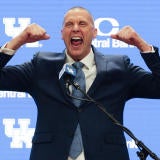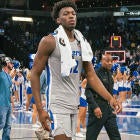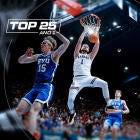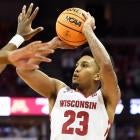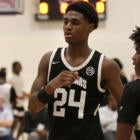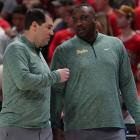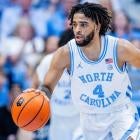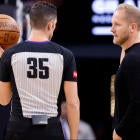On the day of the season-opener, before tipoff back on Nov. 5, the NCAA informed Memphis that James Wiseman was "likely ineligible." Understand, the NCAA didn't use the word "likely" because it was unsure of where this would eventually go, or because the facts of the case were unclear, but only because, at that time, it wasn't the NCAA's place to deem Wiseman ineligible; it was Memphis' responsibility. So don't be confused by semantics. Because, regardless of the wording, the NCAA's message to Memphis, before the season-opener, was clear: Do not play James Wiseman until this issue is resolved or else.
Other schools, over the years, have dealt with similar issues.
They almost always handle them the same way.
What they do is hold the player in question out of games until or unless the issue is resolved, period. It's what Kentucky once did with Enes Kanter. It's what Kansas once did with Billy Preston and Silvio De Sousa. It's what Louisville once did with Brian Bowen. It's what Syracuse once did with Fab Melo, what North Carolina once did with P.J. Hairston, what Auburn once did with Austin Wiley and Danjel Purifoy.
Hell, it's what Ohio State just did with Chase Young.
But Memphis, for reasons that were never sensible, took a different approach. What Memphis did, in total defiance of the NCAA, is run Wiseman out on the court for the season-opener against a South Carolina State team it could've pounded without him. Then Memphis played Wiseman again against Illinois-Chicago. Then Memphis played Wiseman again against Oregon. And though the school finally came to its senses, ruled him ineligible and applied for reinstatement before the fourth game of the season, what the NCAA made clear to Memphis on Wednesday is that eventually doing right doesn't undo an initial wrong.
"James Wiseman ... must sit an additional 11 games (12 total) based on recruiting inducements his family received before he enrolled at Memphis and for competing in three games while ineligible," read an afternoon statement from the NCAA. "He will be eligible to compete in Memphis' Jan. 12 contest at South Florida."
It's impossible to overstate how much that decision, announced three hours before the start of the Tigers' 68-58 win over Little Rock, surprised the Memphis administration. Truth is, sources told CBS Sports, the administration believed, for one reason or another, that Wiseman withdrawing his lawsuit, combined with Memphis ruling him ineligible last week, would lead to the NCAA showing leniency.
Narrator: It did not.
Instead, the NCAA gave Wiseman the nine-game suspension the student-athlete reinstatement guide suggests is appropriate -- then tacked on another three games as punishment for Memphis choosing to play him in those first three games. And, please, don't let anybody trick you into thinking Memphis had "no choice" but to play Wiseman in those first three games after he, as the argument goes, "obtained a temporary restraining order against the NCAA and Memphis." First, no restraining order existed during the season-opener when Memphis allowed Wiseman to play after the school was informed of the eligibility issue. So the temporary-restraining-order argument doesn't even make sense. But, beyond that, all a temporary restraining order could do is prevent Memphis from ruling Wiseman ineligible; it could not force Memphis to play him. No judge can set the Tigers' starting lineup. No judge can tell Memphis whom to put on a court.
So Memphis did this to itself.
And, for the millionth time, yes, I hate the NCAA's rules and would change them tomorrow if I could. I've written that many times -- most thoroughly here. The idea that a single black woman is prohibited from accepting money, for any reason, from a wealthy man without putting her son's college eligibility at risk is utterly ridiculous -- especially when you consider the people who created the rules are largely white and benefiting from them. But, like I wrote on the night the news concerning Wiseman's eligibility issues initially broke, bad rules are still rules just like bad laws are still laws. You can disagree with them intensely -- but you still have to follow them or risk punishment. There's no getting around it. No matter how you feel about the NCAA's rules, once you agree to play for an NCAA-member institution, you, by extension, agree to play by the NCAA's rules. And one of the NCAA's rules, like it or not, is that a family member of a recruitable student-athlete cannot except money from somebody the NCAA labels a "booster."
Everybody knows this.
It's why Memphis was foolish to initially defy the NCAA because there isn't even a smart case to be made, in this instance, against the NCAA. James Wiseman was a top-ranked high school prospect who moved from one city (Nashville) to another (Memphis) in August 2017 to play for Penny Hardaway at East High -- and then he followed Hardaway to college after Hardaway replaced Tubby Smith in March 2018. The NCAA was always going to ask questions about that. And when the NCAA started asking questions, what it learned is that Hardaway, a Memphis booster by definition, once provided $11,500 to Wiseman's mother.
That's an undeniable violation.
It's one thing for fans to perform mental gymnastics and talk themselves into believing an undeniable violation isn't an undeniable violation, and that their school should fight, fight, fight, because fans are often blinded by their fandom and/or ignorant of the NCAA rulebook. So they jump on their message boards and trade comments with other people who are blinded by their fandom and/or ignorant of the NCAA rulebook, and then, before you know it, bless their hearts, they've somehow convinced themselves it's not dumb to start a fight with the NCAA that the rest of the world understands isn't winnable. And when homer media members, and #TwitterLawyers with no skin in the game, reassure the fans that fighting the NCAA on this particular issue really isn't as dumb as the rest of the world is telling them, because, you know, the rest of the world just doesn't understand, well, it only takes a few good threads to work everybody into a frenzy.
But the Memphis administration should've known better.
Because what people who aren't blinded by fandom, and who do understood NCAA rules and how they're applied, said from the jump is that playing James Wiseman in defiance of the NCAA was foolish and risky because it A) almost certainly wouldn't work out in Memphis' favor, and B) could expose the program to additional penalties. And now here we are. If Memphis would've just done what every other school does when faced with a similar situation, Wiseman, it's now clear as day, would've served a nine-game suspension and returned in time for the Tigers' showdown with Tennessee on Dec. 14. But now, because Memphis didn't do what every other school does when faced with a similar situation, Wiseman will serve a 12-game suspension, miss contests against Ole Miss, NC State, Tennessee, Georgia and Wichita State, and be out until the Tigers play USF on Jan. 12. On top of that, Sports Illustrated and The Athletic reported that Memphis will "likely" be the target of a major infractions case because it played Wiseman in defiance of the NCAA in those first three games. And even if a notice of allegations from the NCAA never actually arrives, Hardaway will now have to recruit with the possibility of one hanging over his program. That's not easy. Ask any coach who has ever had to do it for any period of time. It's not easy.
Bottom line, it stinks that James Wiseman, by all accounts a terrific young man, is having to pay a heavy price because of something his coach and mother did reportedly unbeknownst to him, and I don't believe many people would protest if he gets some games back on appeal because the pattern of facts in this case is so unusual and likely unprecedented. But ever since Heisman Trophy winner Cam Newton was allowed to play at Auburn uninterrupted despite his dad's disregard for NCAA rules, the NCAA has been holding student-athletes responsible for the actions of the people around them -- whether it be a father, a coach, a guardian or, in this case, a mother. So once Memphis acknowledged the existence of the payment, there was no fight to fight. The only sensible thing, at that point, was for Memphis to take its medicine and minimize the damage.
But Memphis instead spit its medicine out.
And on Wednesday, in clear terms, the NCAA reminded the school, and every other member institution, what happens when you decide to ignore the rules you agree to follow. It's an approach that might play well on the internet and generate support from people who don't matter. But, ultimately, almost always, there will still be a price to pay -- and a bigger one. So now Memphis and Wiseman are paying a bigger price than they otherwise would've paid. And with the threat of a major infractions case that could theoretically bring a future postseason ban and any number of other sanctions now part of the public record via Sports Illustrated and The Athletic, Memphis could end up paying an even bigger price for an even longer time.
And for what?
So James Wiseman could play against South Carolina State, Illinois-Chicago and Oregon? With the benefit of hindsight, it's impossible to argue the decision Memphis made wasn't shortsighted and ill-advised. But the real problem is that it shouldn't have taken hindsight to see it because it was also obvious, back before the season-opener, when the people who should've been dedicated to protecting James Wiseman and the Memphis program let him play for no good reason while creating additional issues that could prove costly this season and for many seasons to come.












